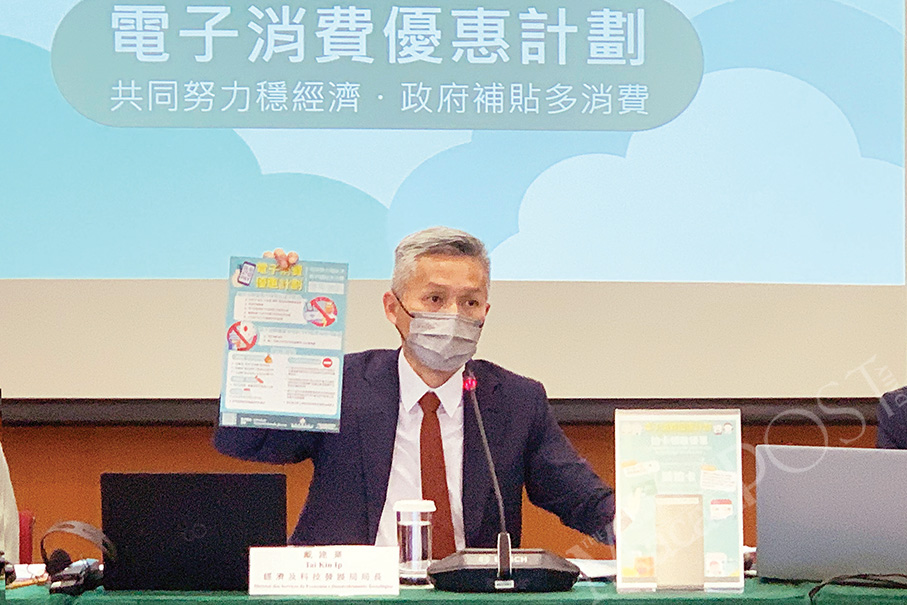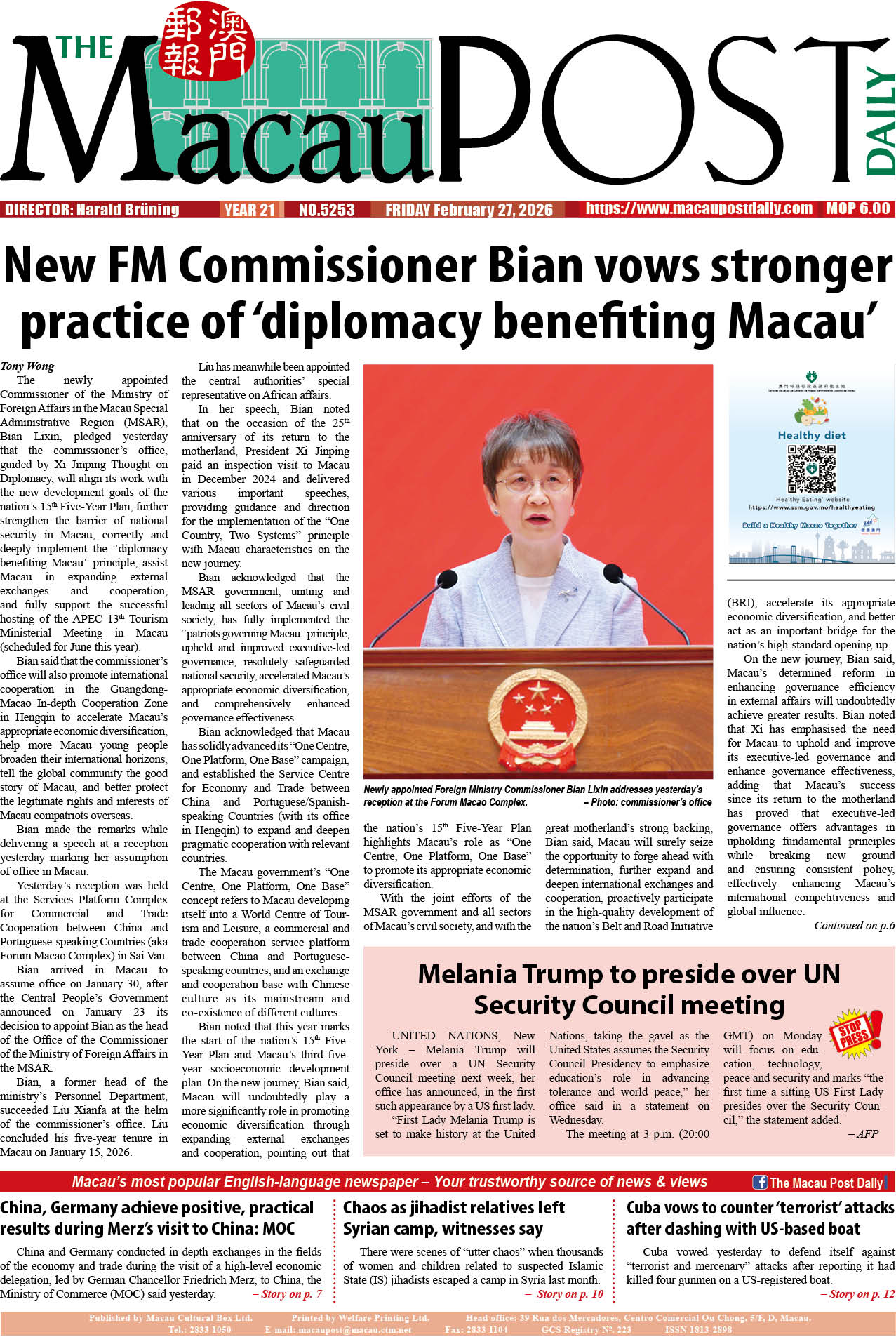The new round of the government’s electronic consumption benefits plan online signup starts tomorrow at 9 a.m., but non-resident workers (NRW) are still excluded from the scheme, Economic and Technological Development Bureau (DSEDT) Director Tai Kin Ip told reporters yesterday during a press conference about the plan at the Government Headquarters in Nam Van.
When reporters asked why NRWs are not included in the plan, Tai said the government announced last week that it was still studying and researching the matter, adding that he would make no further comment.
Tai said that permanent and non-permanent residents are eligible for the plan, adding that they will each receive a 5,000-pataca startup fund and a 3,000 pataca immediate discount grant. According to Tai, those eligible can start signing up tomorrow on the Monetary Authority of Macau (AMCM) website at https://www.dsedt.gov.mo/econsumo/zh_TW/self_reg_loc.jsp. Tai pointed out that when signing up for the plan, one needs to choose how to receive their startup fund –whether through topping up last year’s consumption smartcard or through one of the eight local e-payment platforms.
Tai added that the signup period runs until December 10, therefore residents should not rush to sign up on the first day. Tai reminded residents that the eight-local e-payment wallets have posted their own “add-on” discounts, and he encouraged residents to do some research before signing up for the plan with an e-payment platform.
Yau Yun Wah, head of DSEDT’s Economic Activities Development Department, said that in order to receive the startup fund through one of the eight local e-payment platforms, one must have a verified account. He added that after signing up on the website with a valid e-payment account, residents will receive a confirmation text on their mobile phone, pointing out that two working days later they will receive another text telling him them that the government has verified the signup and the government will directly deposit the startup fund to one’s account.
Moreover, Yau said that for residents who want to top-up their consumption smartcards from last year, they can also sign up on the website. He noted that those residents will also receive the two texts – one after the signup and another text after two working days. Yau said that residents can take their consumption smartcards to over 170 outlets for top-ups.
However, for those who did not sign up last year and would like to have their startup fund through a new consumption smartcard, Yau said, residents will need to take an extra step. Yau said residents still need to sign up on the website, and choose a location and date to pick up the consumption smartcard. Yau said then residents will receive a confirmation text and on the selected date they must take their ID documents to the selected location to get the smartcard. Meanwhile, for the first-timers who want to receive their startup fund on one of the eight e-payment platforms, they will only need to sign up on the website with a registered and verified e-payment account.
For new-born babies, Yau said, their parents can sign up for a consumption smartcard when they are applying for the babies’ ID documents at the Identification Services Bureau (DSI).
Yau noted that residents will be able to receive or top-up the startup fund starting on May 24 but they can only start spending the money on June 1. Yau said that residents can spend the money between June 1 and December 31.
Transfer credits to others
Yau said that if one wants to authorise someone else to receive the startup fund and the immediate discount grant, there are several steps to follow. Yau noted that if the person had already authorised someone else to collect their benefits during the last two rounds of the electronic consumption benefits plan through last year’s smartcard, then one only needs to sign up on the website and ask the authorised person to take his or her consumption smartcard to one of the outlets to top it up.
However, if one wants to transfer the credit (both the fund and the grant) to the authorised person’s e-wallet, Yau said then one would need to complete an authorisation form and mail the hard copy of his or her ID document to the authorised person. Yau said that one will still need to first sign up on the website and choose to transfer the credits to another person’s verified e-payment account. Yau stressed that after signing up, one will receive a confirmation text.
Yau underlined that then the authorised person must take the document and the form along with his or her own ID document on May 24 or afterwards to the respective e-payment’s entity to get approved. For example, Yau said, if the authorised person would like to receive the credits through BOC Pay, then one would need to take the documents to one of the Bank of China Macau branches. Yau added that if the e-payment platform approves the authorised person to receive the transferred credit, the authorised person will receive another text after two working days, and the transferred credit will be deposited to the authorised person’s e-payment account automatically.
Meanwhile, for those who did not apply for the consumption subsidy last year and would like to have an authorised person to pick up their first consumption smartcard, Yau said, they will also have to sign up on the website and they can choose where the authorised person should pick up the consumption smartcard.
Yau added that the authorised person will need the three documents – the applicants’ Macau ID, the authorised person’s Macau ID and the authorisation form – and take them to the chosen card-pick-up location on or after May 24.
According to Yau, parents with underage children can also use the transfer system.
Yau also said that the authorisation form can be found on the AMCM website.
How to spend startup fund, immediate discount grant and transferred credits
Yau said that residents who are spending the startup fund will automatically get 25 percent off from the immediate discount grant, adding that the daily limit for the fund is 300 patacas per day while the daily limit for the grant is 100 patacas per day. He pointed out that if residents have a balance lower than 10 patacas in their startup fund and would like to spend the remaining immediate discount grant, they can top up their cards or e-wallets with their own money. After topping up the cards with their own money, Yau said, there will no longer be a daily limit on the immediate discount grant.
Yau gave the following example: if a female resident purchases a baby product costing 400 patacas, with the 25 percent off, which would be a 100 pataca discount, the product would cost the buyer 300 patacas. He added that in this case the female resident would use the maximum amount of the daily limit of her startup fund, which is 300 patacas, to cover the cost of the product, so she would not need to pay for it from her own pocket. Yau stressed that after the purchase, the resident would have 4,700 patacas left of her startup fund and 2,900 patacas left of the discount grant.
According to Yau, for residents who do not spend the entire fund or grant before December 31, the money will be returned to the public coffers.
Yau also mentioned that for those who get extra credit from other people’s authorisation will have a higher daily limit. Yau said, for example, that if a male resident’s child transfers his or her credit to his e-payment account, his daily fund limit will double to 600 patacas per day and the grant limit will increase to 200 patacas per day. Yau pointed out that one can at most receive eight people’s credits – his or her own credit plus seven other people’s authorised credits— and all must be deposited to the same e-payment account.
Tai added that, however, if the male resident in Yau’s example spends 5,000 patacas of his startup fund and his remaining balance reaches 5,000 patacas, the daily fund limit will be reduced back to 300-patacas per day and the daily grant limit will be 100-patacas.
In another example, Tai said if the father of a family is in charge of his two children’s credits and his own credit, then he would have 15,000 patacas in his startup fund and 9,000 patacas in his immediate discount grant. Tai added that, in this case, the father’s daily fund limit will be 900 patacas and daily grant limit will be 300 patacas. Tai said if the father’s fund balance reaches 10,000 patacas after spending 5,000 patacas of the fund money, his daily fund limit will decrease to 600 patacas per day and daily fund limit will decrease to 200 patacas per day. Tai also said that if the father has a remaining balance of 5,000 patacas in his startup fund, then his daily fund limit will drop to 300 patacas per day and daily grant limit will be 100 patacas per day.
Moreover, Tai said that residents will be able to use the startup fund and immediate discount grant for online delivery platforms, certain car parks and parking meters, and public transport.
Yau underlined that the startup fund and the discount grant cannot be used for certain purposes, such as for casino gambling, or to pay utility, telephone and Macau Cable TV bills, medical bills, nor for bank, insurance and pawnshop payments, and cross-border or outbound-travel fees. Tai also pointed out that the benefits cannot be used either for spending on non-local online shopping platforms.
Special cases: lost card and Macau Pass
Yau said that those who have misplaced their consumption smartcards have to report the case to the police and have physical proof of their reported case before they can apply for a new one.
Meanwhile, those who have been using last year’s consumption smartcard as a regular Macau Pass card must clear their balance to zero before topping up their card, according to Yau.
However, DSEDT’s senior official Polly Lam Yi told The Macau Post Daily yesterday that for those who have been using last year’s consumption smartcard as a regular Macau Pass can also apply for a new one online.
Tai also said that for families who have more than one card from last year’s electronic consumption benefits plan and are confused which card belongs to whom, they can check their card number on the AMCM website.
At the end of the press conference, Tai said that his bureau will be collaborating with the Social Welfare Bureau (IAS) to set up different locations to assist and explain the electronic consumption benefits plan to residents. For more information, residents can call 2856 5071/ 2856 5072/ 6299 8235 or email exonsumption@amcm.gov.mo / econsumo@dsedt.gov.mo.

Economic and Technological Development Bureau (DSEDT) Director Tai Kin Ip shows reporters posters of the new electronic consumption benefits plan at yesterday’s press conference at the Government Headquarters in Nam Van. Photo: Prisca Tang

Economic and Technological Development Bureau (DSEDT) Director Tai Kin Ip (left) and Yau Yun Wah, head of DSEDT’s Economic Activities Development Department pose before yesterday’s press conference. Photo: Prisca Tang

The DSEDT website’s QR code about the new electronic consumption benefits plan, downloaded from the website of the Macau Government Information Bureau (GCS) last night








